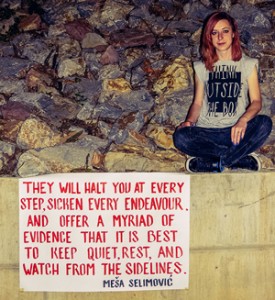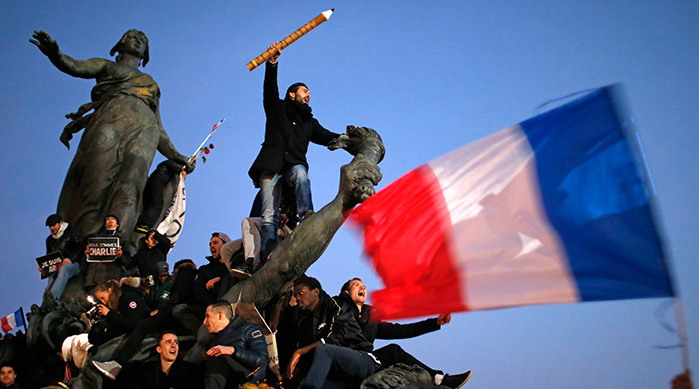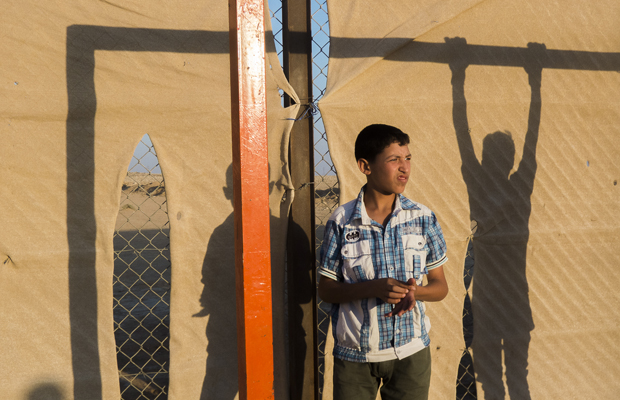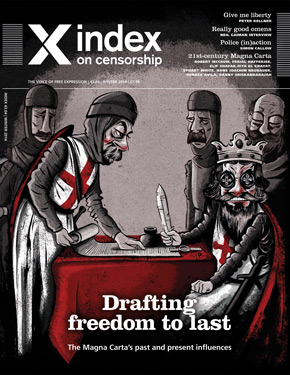23 Oct 2015 | Campaigns, mobile, Youth Board

Lejla Becar, from Bosnia and Herzegovina, is a member of the current Index Youth Advisory board. Learn more
Index on Censorship is recruiting for its next Youth Advisory Board.
This is your chance to be associated with a media and human rights organisation, and have the opportunity to discuss freedom of expression issues you feel strongly about with Index and peers from around the world. We will give you the chance to speak to senior staff within Index or the media/human rights/arts sectors, helping you to develop your knowledge and extend your personal networks. You’ll also be assigned monthly tasks to broaden your skills and you will be featured on our website (see the current board here).
The new board will hold the position for six months from January-June 2016.
We are looking for enthusiastic young people, aged between 16-25, who must be committed to attending monthly meetings, which are held online with fellow participants. Applicants can be based anywhere in the world. We are looking for people who are communicative and who will be in regular touch with Index.
If you would like to apply, please submit a brief 200-word, blog-style piece about a current freedom of expression issue, along with your CV and covering letter to [email protected] by 5pm on Friday 4 December 2015.
Successful applicants will be contacted via email before the end of December 2015.
Find out more about the Index Youth Advisory Board below:
What is the youth board?
The youth board is a specially selected group of young people aged 16-25 who will advise and inform Index on Censorship’s work, supporting our ambition to fight for free expression all around the world and ensuring our engagement with issues relevant to tomorrow’s leaders.
Why has Index started a youth board?
Index on Censorship is committed to fighting censorship not only now, but also in future generations, and we want to ensure that the realities and challenges experienced by young people in today’s world are properly reflected in our work.
Index is also aware that there are many who would like to commit some or all of their professional lives to fighting for human rights and the youth board is our way of supporting the broadest range of young people to develop their voice, find paths to freely expressing it and potential future employment in the human rights/media/arts sectors.
What does the youth board do?
Board members meet once a month via Google Hangout to discuss the most pressing freedom of expression issues of the moment, where they will be given a monthly task to complete, and will also set that months question for our project, #IndexDrawtheLine. There is also the opportunity to get involved with events such as debates and workshops for our work with young people and events, such as our annual Index Freedom of Expression Awards and Index on Censorship magazine launches.
How do people get on the youth board?
Each youth board will sit for a term of six months. Current board members are invited to reapply up to one time. The board will be selected by Index on Censorship in an open and transparent manner and in accordance with our commitment to promoting diversity.
Meet the current Youth Advisory Board here.
23 Sep 2015 | Magazine, Volume 43.04 Winter 2014
In conjunction with the Cambridge Festival of Ideas 2015, we will be publishing a series of articles that complement many of the upcoming debates and discussions. We are offering these articles from Index on Censorship magazine for free (normally they are held within our paid-for archive) as part of our partnership with the festival. Below is an article by Max Wind-Cowie on free speech in politics, taken from the winter 2014 issue. It’s a great starting point for those who plan to attend the Elections – live! session at the festival this year.
Index on Censorship is a global quarterly magazine with reporters and contributing editors around the world. Founded in 1972, it promotes and defends the right to freedom of expression.
We are often, rightly, concerned about our politicians censoring us. The power of the state, combined with the obvious temptation to quiet criticism, is a constant threat to our freedom to speak. It’s important we watch our rulers closely and are alert to their machinations when it comes to our right to ridicule, attack and examine them. But here in the West, where, with the best will in the world, our politicians are somewhat lacking in the iron rod of tyranny most of the time, I’m beginning to wonder whether we may not have turned the tables on our politicians to the detriment of public discourse.
Let me give you an example. In the UK, once a year the major political parties pack up sticks and spend a week each in a corner of parochial England, or sometimes Scotland. The party conferences bring activists, ministers, lobbyists and journalists together for discussion and debate, or at least, that’s the idea. Inevitably these weird gatherings of Westminster insiders and the party faithful have become more sterilised over the years; the speeches are vetted, the members themselves are discouraged from attending, the husbandly patting of the wife’s stomach after the leader’s speech is expertly choreographed. But this year, all pretence that these events were a chance for the free expression of ideas and opinions was dropped.
Lord Freud, a charming and thoughtful – if politically naïve – Conservative minister in the UK, was caught committing an appalling crime. Asked a question of theoretical policy by an audience member at a fringe meeting, Freud gave an answer. “Yes,” he said, he could understand why enforcing the minimum wage might mean accidentally forcing those with physical and learning difficulties out of the work place. What Freud didn’t know was that he was being covertly recorded. Nor that his words would then be released at the moment of most critical, political damage to him and his party. Or, finally, that his attempt to answer the question put to him would result in the kind of social media outrage that is usually reserved for mass murderers and foreign dictators.
Why? He wasn’t announcing government policy. He was thinking aloud, throwing ideas around in a forum where political and philosophical debate are the name of the game, not drafting legislation. What’s more, the kind of policy upon which he was musing is the kind of policy that just a few short years before disability charities were punting themselves. So why the fuss?
It’s not solely an issue for British politics. Consider the case of Donald Rumsfeld. Now, there’s plenty about which to potentially disagree with the former US secretary of state for defense – from the principles of a just war to the logistics of fighting a successful conflict – but what is he most famous for? Talking about America’s ongoing conflicts in the Middle East, he thought aloud, saying “because as we know, there are known knowns; there are things we know we know. We also know there are known unknowns; that is to say we know there are some things we do not know. But there are also unknown unknowns – the ones we don’t know we don’t know.” The response? Derision, accompanied by the sense that in speaking thus Rumsfeld was somehow demonstrating the innate ignorance and stupidity of the administration he served. Never mind that, to me at least, his taxonomy of doubt makes perfect sense – the point is this: when a politician speaks in anything other than the smooth, scripted pap of the media relations machine they are wont to be crucified on a cross of either outrage, mockery or both. Why? Because we don’t allow our politicians to muse any longer. We expect them to present us with well-polished packages of pre-spun, offence-free, fully-formed answers packed with the kind of delusional certainty we now demand of our rulers. Any deviation – be it a “U-turn”, an “I don’t know” or a “maybe” – is punished mercilessly by the media mob and the social media censors that now drive 24-hour news coverage.
Let me be clear about what I don’t mean. I am not upset about “political correctness” – or manners, as those of us with any would call it – and I am not angry that people object to ideas and policies with which they disagree. I am worried that as we close down the avenues for discussion, debate and indeed for dissent if we box our politicians in whenever they try to consider options in public – not by arguing but by howling with outrage and demanding their head – then we will exacerbate two worrying trends in our politics.
First, the consensus will be arrived at in safe spaces, behind closed doors. Politicians will speak only to other politicians until they are certain of themselves and of their “line- to-take”. They will present themselves ever more blandly and ever less honestly to the public and the notion that our ruling class is homogenous, boring and cowardly will grow still further.
Which leads us to a second, interrelated consequence – the rise of the taboo-breaker. Men – and it is, for the most part, men – such as Nigel Farage and Russell Brand in the UK, Beppe Grillo in Italy, Jon Gnarr in Iceland, storm to power on their supposed daringness. They say what other politicians will not say and the relief that they supply to that portion of the population who find the tedium of our politics both unbearable and offensive is palpable. It is only a veneer of radicalism, of course – built often from a hodge-podge of fringe beliefs and personal vanity – but the willingness to break the rules captures the imagination and renders scrutiny impotent. Where there are no ideas to be debated the clown is the most interesting man in the room.
They say we get the politicians we deserve. And when it comes to the twin plaques of modern politics you can see what they mean. On the one hand we sit, fingers hovering over keyboards, ready to express our disgust at the latest “gaffe” from a minister trying to think things through. On the other we complain about how boring, monotonous and uninspiring they all are, so vote for a populist to “make a point”. Who is to blame? We are. It is time to self-censor, to show some self-restraint, and to stop censoring our politicians into oblivion.
© Max Wind-Cowie and Index on Censorship
Join us on 25 October at the Cambridge Festival of Ideas 2015 for Question Everything an unconventional, unwieldy and disruptive day of talks, art and ideas, featuring a broad range of speakers drawn from popular culture, the arts and academia. Moderated by Index on Censorship CEO Jodie Ginsberg.
This article is part of the winter 2014 issue of the global quarterly Index on Censorship magazine. Click here to subscribe to the magazine.
4 Jun 2015 | Events

Photo: Thomson Reuters Foundation
Six months after the Charlie Hebdo attacks in Paris, journalists face more threats than ever before, from harassment to imprisonment to murder – since the beginning of the year, 50 journalists have been killed.
While some countries, like Norway, have scrapped blasphemy laws to strongly assert freedom of speech, others such as the UK are increasing state surveillance and censorship to “protect citizens from violence”. How can international law protect journalists in this challenging and unique context? Is it possible to strike a balance between security concerns and freedom of expression? Is the right to free speech an absolute one?
Join the Thomson Reuters Foundation, Reporters Without Borders and Paul Hastings LLP for a panel debate featuring:
- John Lloyd, Reuters Institute and Financial Times
- Prof Timothy Garton Ash, Oxford University
- Sylvie Kauffmann, Le Monde
- William Bourdon, Paris Bar and Association Sherpa
- Jodie Ginsberg, Index on Censorship
When: Monday 29 June, 6:00pm (followed by drinks reception & canapés)
Where: Edelman, London, SW1E 6QT (Map/directions)
Tickets: Free, book here
#FreeSpeechDebate
25 Mar 2015 | Magazine, mobile, Volume 44.01 Spring 2015

A picture from the Do You See What I See project which teaches photography skills to young refugees, Zaatari camp, Jordan (Credit: Mohamed Soleman/Do You See What I See)
In an article from the refugee voices special issue of Index on Censorship Magazine, Jason DaPonte looks at how migrants are using technology to keep in touch with distant relatives, and the security risks this can bring
“My wife changes her sim card every week,” said Omid, an Iranian refugee who hasn’t seen his wife in the seven years he has been awaiting a decision in his UK asylum case. The couple use Viber, a mobile app that allows free voice calls over the internet, but his wife remains in constant fear of surveillance. Omid is wanted by the Iranian state for political offences. He’s also a convert to Christianity and his wife fears discussing his new religion, as even members of his own family have branded him an infidel.
Refugees may be some of the most excluded people in society, but social media and new technology nevertheless play a crucial role in many of their lives. Across the globe, refugees are finding ways of using them to stay connected to families, homelands and political causes, in ways they couldn’t have a decade ago – even though it can have security implications. A number of refugees, particularly from Syria, suggested they use the free messaging mobile app, WhatsApp, because they believe the messages are secure. Whether WhatsApp messages can be hacked or intercepted is not clear, however.
Ismail Einashe, a British journalist and Africa expert, originally from Somaliland, explained another way social media is changing the refugee experience. He said how his teenage cousin, who fled Somaliland for Austria, uses Facebook for photo-sharing, to craft an image of success and happiness. But this can potentially hide the true difficulties of refugee life.
“My cousin is inspired by American hiphop. He wears baseball caps and baggy jeans – so his friends at home see the glamorous ‘other’ and they don’t see the high unemployment or poverty among refugees. It’s partly encouraging the young generation. Before, people didn’t see what life on the other side could be and now they can see it,” he told Index.
Nearly every refugee interviewed for this article said that free calls on Skype and the ability to connect with relatives for free using standard social platforms (like Facebook) is invaluable to them. But for some, sharing stories from exile goes beyond simple messaging and status updates. Some refugees use blogs and social media channels to publish content banned at home to try to fight the repression they escaped.
Moses Walusimbi fled Uganda’s anti-gay laws for The Netherlands and now runs Uganda Gay On Move – a blog, Facebook and Twitter movement that helps gay Ugandans and Africans who have fled persecution, as well as providing information for those who are left behind and remain under threat.
“When I came to Holland, I realised the more you keep quiet the more you suffer,” Walusimbi told Index. “I was very eager to know if there were any other Ugandans who are in Holland who are like me, in the same situation. And when I started these social media things, many Ugandans responded.”
His movement now has almost 9,000 followers on Facebook, which he says is the most popular platform for his content. He also has followers on Twitter and his blog. Uganda Gay On Move is providing a support network that goes beyond publishing, with many photos of meetings between its members for social and political reasons.
“Uganda Gay On Move is like a family to us now. It’s like a family because we come together, we discuss, we find solutions,” said Walusimbi. These solutions have included the group petitioning and lobbying the Dutch parliament to raise awareness about the denial of the human rights of gay Ugandans and other Africans. It also publishes information that helps asylum-seekers manage their cases and gather evidence. But Walusimbi still worries about those in Uganda who could face jail sentences simply for reading it.
“Ugandan LGBTI people – unless well-known human rights defenders – tend to use false names on Facebook. There is also a danger when people attend internet cafes and do not securely log off. There is also a danger – and I have had several direct reports of family or friends seeing the Facebook pages left open on computers in homes. Some people have been exposed this way,” Melanie Nathan, an LGBTI activist and publisher who has worked closely with African LGBTI movements, told Index. “Using Facebook could result in meetings or revealing real names through trust and then in entrapment.” Walusimbi corroborated that there are real cases where this has happened.
Blogs by and for refugees from various conflict zones are building audiences. The Medeshi Somaliland blog is one example. It was founded with a desire to keep in touch with a dispersed family and diaspora in 2007 by Mo Ali, who left Somaliland to seek asylum in the UK in 2004. His work of aggregating and creating new content quickly became more political.
“There are many websites about Somaliland and those who are publishing there have been harassed by the police. They’ve been ordered to shut down because of being critical of the government on freedom of speech and press,” Ali told Index, saying he knows of at least three websites that have been shut down and explaining why he has to publish from abroad.
Even publishing from the UK, he doesn’t feel totally safe, “I’ve received death threats via email but I published the threat online and nothing happened. I’m still alive. It was just intimidation.”
Like Uganda Gay On Move, Ali has used the blog’s following to campaign, and in 2010 and 2012 rallied more than 1,000 of his followers to lobby outside London’s Parliament for official recognition of Somaliland.
Refugees are working on their own and with professional content and software creators to find bespoke ways to tell their stories. Dadaab Stories and the related Refugee News are two of the most elegant projects that have used the power of free social media tools (particularly Tumblr and YouTube) to help refugees publish stories. In these cases, professional filmmakers and refugees worked together to create ongoing social media coverage of the refugee camp for Somalians in Kenya.
Globally available and free technology platforms are helpful, but tools, platforms and projects are now emerging that are specifically aimed at refugees to allow them to self-organise and connect digitally.
Refunite is a social network designed to connect dispersed families that have low access to technology following displacement. It allows refugees to remain anonymous to everyone other than their family members, which aids those who may not be able to register with formal institutions because they are awaiting asylum decisions or are stateless. The platform currently reaches more than 500,000 refugees and is aiming to connect 1 million during 2015. It is geared towards low-end mobile technology to ensure that nearly anyone can use it. It can even be accessed using an interactive voice response system or text-messaging for those who are illiterate or don’t have internet access.
Low-cost and low-barrier-to-entry technologies such as these are proving to be a key part of connecting refugees in crisis. The UNHCR is telling the world the story of Jordan’s Zaatari camp via Twitter (which has claimed to be the first refugee camp with an official Twitter account). Nasreddine Touaibia, a UNHCR communications associate at the camp described how WhatsApp, a free or low-cost mobile messaging system, is being used by Syrian refugees to self-organise. “Urgent messages are sent to these groups and they are reflected in the Facebook group later. It’s their own emergency broadcast network,” he told Index, describing how WhatsApp had been used to give warnings when flooding occurred at the camp.
South African technology startup Vumi is now trying to build on this trend of using low-cost messaging services to create technical products that can empower refugees to self-organise at scale. Its platform uses mass mobile messaging and low-fi browsing to enable access to civic information.
Building on its success in Libya of technically enabling Wikipedia Zero (a Wikipedia Foundation project which gives access to Wikipedia without data charges in 35 countries) and distributing voter information, the company is now in the planning stages for a project focussed on empowering refugees, in partnership with South Africa’s Lawyers for Human Rights, an NGO that deals largely with refugees in South Africa.
Various NGOs and other services are also using social media to provide platforms that help refugees re-settle. These are largely regionally based and aim to help refugees understand the legal and social contexts they are in. In the UK, the Refugee Council and Bail for Immigration Detainees provide online resources and tools that help refugees build and understand their legal cases. Migrant Voice, another UK-based organisation, provides training and tools to allow migrants (including refugees) to publish and communicate their stories.
Refugees and migrants certainly benefit from the uses of social media that everyone with internet access does; but the emerging platforms in the space are where the traditional model of solitary, isolated migrants can be disrupted. Tools specifically tailored to the needs of the excluded have the potential to create the most significant change in a networked world.
To read other articles from the issue, subscribe to the magazine in print, iPad, or phone find out more here or on iTunes, search for “Index on Censorship”.
This article and photograph is part of Across the wires, the spring 2015 issue of Index on Censorship magazine, and should not be reproduced without permission of the magazine editor. Follow the magazine on @Index_magazine
© Jason DaPonte





